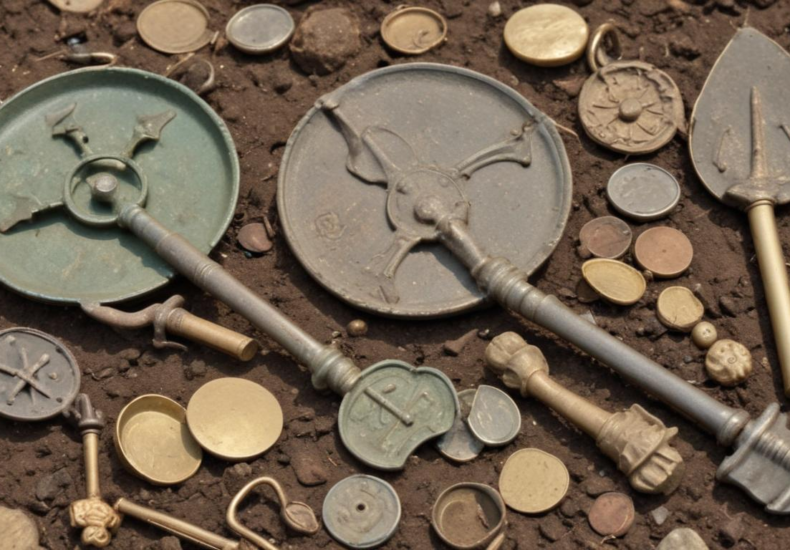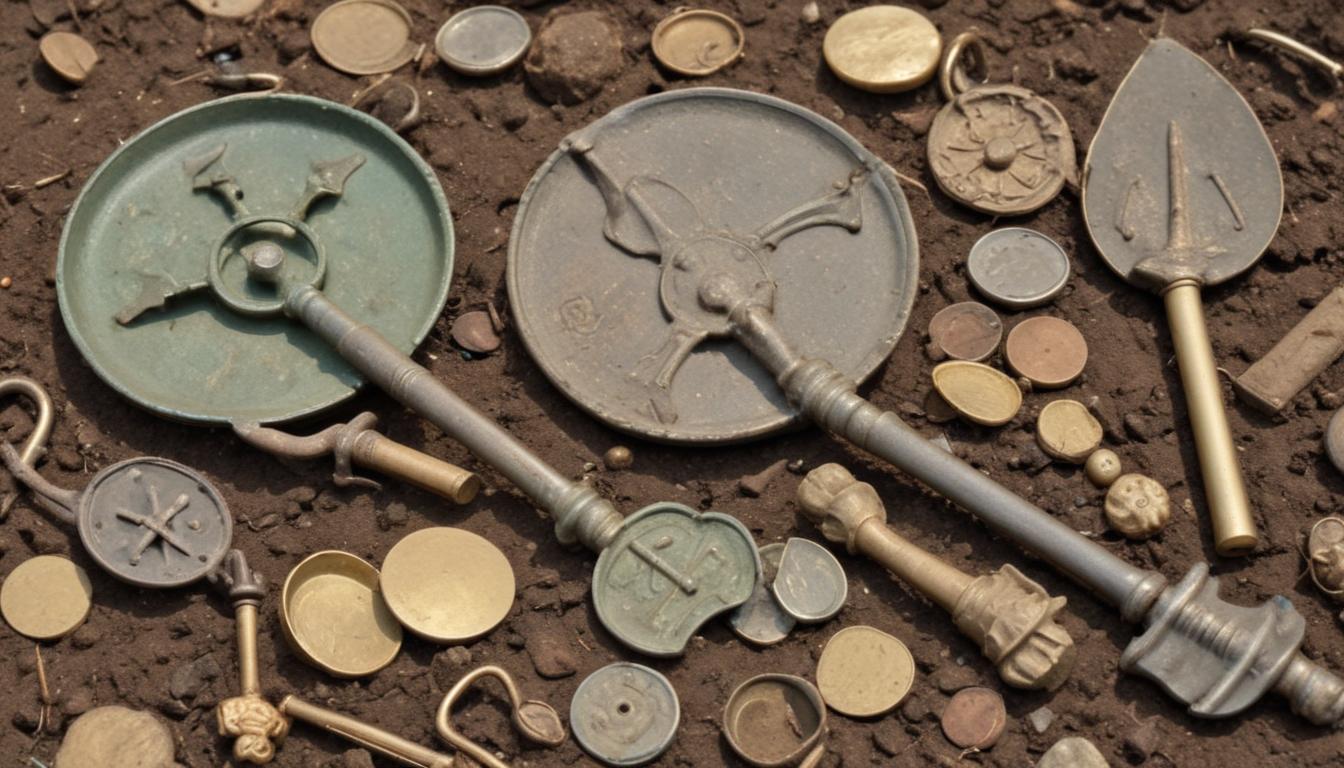
Should you report your major metal detecting finds?
When engaging in metal detecting, it’s imperative to recognize the legal responsibilities associated with the discovery of potential historical artifacts. In many countries, there are specific laws that govern the reporting and handling of finds that might be of historical or cultural significance. The fundamental principle behind these laws is to preserve heritage and prevent the loss of archaeological context that could occur if items were indiscriminately removed from their sites.
In the United States, for instance, the legal framework varies significantly from one state to another. However, federal laws, such as the Archaeological Resources Protection Act (ARPA) of 1979, provide overarching regulations that prohibit the removal of artifacts from federal lands without a permit. It’s crucial to investigate local and state laws, as these can impose additional stipulations or reporting requirements. Failure to comply with these laws, including the deliberate concealment or sale of found artifacts, can result in severe penalties, including fines and imprisonment.
Beyond federal and state regulations, there may be specific ordinances at local levels or rules laid out by the owners of private lands. A common requirement is to seek permission from landowners before metal detecting, and this often includes an agreement on the distribution or reporting of any finds made on their property. Reporting finds not only ensures compliance with these laws but also contributes to the broader historical knowledge base, assisting scholars and historians in piecing together past civilizations and cultures.
It’s also helpful to connect with local historical societies or metal detecting clubs to stay informed on the latest legal requirements and best practices for reporting finds. These organizations can provide valuable insights and support to ensure hobbyists understand their obligations and can enjoy their pursuit without inadvertently violating legal parameters.
Respecting the laws governing historical artifacts is not just about legal compliance but about ensuring that historical treasures can be studied and appreciated by future generations. Whether a casual hobbyist or a serious metal detecting enthusiast, understanding these legal obligations is a crucial component of responsible treasure hunting.
Ethical considerations for hobbyists
While navigating the realm of metal detecting, hobbyists face not only legal but also ethical responsibilities, particularly when it comes to significant metal detecting finds. Ethically, when finders uncover objects that could potentially add to the academic and historical narrative, they are implicitly tasked with deciding how their actions will serve the larger good. The question of whether to report discoveries isn’t just about compliancy with laws; it’s also about contributing positively to historical preservation and cultural heritage.
Metal detecting can sometimes be seen as a treasure hunt, but it’s important to remember that the “treasures” unearthed may be significant historical artifacts that have immense cultural value. Each find can offer insights into past societies, trades, migrations, and life ways that are invaluable to historians and archaeologists. By choosing not to report finds, hobbyists may inadvertently deprive the academic community—and indeed the broader public—of pieces of history that could reshape current understandings of historical timelines and narratives.
Moreover, ethical considerations extend to the handling and treatment of discovered items. Once an item is removed from its resting place, it loses its archaeological context, which is crucial for scientific study. Reporting finds allows for a systematic, professional approach to excavation and preservation, ensuring that as much information as possible is retained. Ethically, the importance of this process cannot be overstressed—without context, an artifact’s true historical value and its ability to contribute to our knowledge is significantly diminished.
Another crucial ethical aspect involves the relationship between hobbyists and the lands they explore. Many sites are on private property, or on lands with significant cultural heritage to specific groups, particularly indigenous communities. Respecting these ownership rights, understanding the significance of the land, and working in collaboration with landowners or custodians when reporting finds not only fosters good relationships but also aligns with broader ethical practices respecting heritage and propriety rights.
Ultimately, embracing these ethical considerations not only enriches the hobbyist’s experience but also enhances the collective understanding of history. The act of responsibly reporting finds ensures that hobbyists can be proud contributors to the enduring story of human civilization, fostering a legacy of respect and knowledge sharing that benefits all.
The impact on archaeological studies
The significance of reporting finds by metal detector hobbyists goes beyond fulfilling legal obligations; it directly influences the realm of archaeological studies. Every artifact unearthed has the potential to contribute valuable data to the archaeological record, helping professionals reconstruct past human activity and offer new interpretations of history. When historical artifacts are correctly reported, archaeologists can conduct further research in the area, potentially leading to more significant discoveries. Such collaborative efforts between detectorists and archaeologists can also lead to the development of deeper, more systematic studies that utilize a combination of advanced technologies and traditional archaeological methods.
Archaeological context refers to the position and association of an artifact in relation to other archaeological materials. Once an artifact is removed from its original setting, that context is lost forever unless proper documentation and reporting procedures are followed. Reporting finds allows archaeologists to preserve at least some of this valuable context. It is particularly crucial because context can often tell more about an artifact’s purpose and era than the item itself might suggest when viewed in isolation.
Non-reporting of finds, therefore, poses a significant risk. It can lead to a fragmented understanding of historical sites and might result in biased records that only tell part of the story. Furthermore, unreported finds could lead to illegal trading and selling of historical artifacts, which is a substantial global concern that undermines both legal frameworks and ethical norms. Successful prosecutions in such cases often hinge on the established laws protecting cultural heritage, accentuating the need for full compliance by the detecting community.
Moreover, reporting finds has also been instrumental in revising previous archaeological assessments and narratives. New finds can challenge old assumptions about the history of a place or culture, leading to updated and more accurate historical records. This dynamic interaction between hobbyists and professionals, facilitated by the responsible reporting of discoveries, enriches our collective understanding and appreciation of the past, ensuring a well-rounded historical record for future generations.
The impact of reporting finds by metal detector enthusiasts on archaeological studies cannot be underestimated. It is a practice that not only abides by laws regarding historical artifacts but significantly contributes to the broader field of archaeology, enabling a more comprehensive understanding of historical contexts and ensuring that the stories hidden beneath our feet are not lost to time but are instead added to the annals of human history.
How to properly report a find

Properly reporting a find made during metal detecting is an essential step that serves both legal and ethical purposes. If you are fortunate enough to unearth something that might be of historical significance, knowing the correct procedures for reporting it ensures that your discovery can be officially recognized and preserved.
The first step in reporting a find is to determine the appropriate local or regional authority to contact. This could be a government body tasked with cultural heritage, such as the State Archaeology Department or a local museum with an interest in historical artifacts. Each jurisdiction typically has its own procedures, so it’s crucial to gather this information beforehand. A starting point can often be found on government websites, or by contacting local historical societies or archaeological organizations.
When preparing to report a find, you should document the item and its context as thoroughly as possible. This includes taking photographs of the item in situ (where it was found) before removal, and noting its exact location using GPS coordinates if possible. It’s also advisable to record the date and the conditions under which the find was made. Such detailed documentation helps maintain some of the item’s context, which can be invaluable to professional archaeologists later on.
It is important when handling the find to ensure minimal contact or disturbance. If the item is fragile or seems particularly old, it’s best to limit handling and exposure to the elements. Sometimes, it might even be necessary to leave the artifact in place and report your discovery to the relevant authorities, allowing them to recover it professionally if deemed necessary. This approach is often required under laws protecting historical artifacts on public land, where removing the item without permission could be illegal.
After documenting and, if permissible, collecting the find, the next step is to formally report it to the identified authority. This is usually done through a written report, submitted either electronically or in paper form, which should include all of your documentation and a detailed account of the discovery.
Finally, maintaining a personal record of all communications about your find is advisable. This record can be helpful in case of any legal inquiries or interests from the academic community. It also establishes a clear trail of your compliance with local laws regarding the reporting of finds.
Understanding these steps and following them rigorously not only adheres to legal requirements but also greatly supports the preservation of historical artifacts. Proper reporting allows these items to be studied and potentially displayed, contributing to public knowledge and appreciation of our shared history.
Benefits of reporting your discoveries
Discovering significant historical artifacts while metal detecting can be thrilling, but the benefits of reporting these finds to the appropriate authorities extend beyond personal excitement. When individuals report their discoveries, they play a critical role in the ongoing effort to document and preserve our cultural heritage. One major benefit of reporting finds is enhancing the community’s understanding of its history. Each item unearthed and reported contributes a piece of the complex puzzle of our past, enabling a more comprehensive understanding of the timeline and evolution of human civilization in specific areas.
Additionally, reporting finds often garners positive public attention and appreciation for the hobby of metal detecting itself. This can lead to increased public support and acceptance, potentially easing local laws or restrictions related to metal detecting. It also opens up opportunities for collaborations between hobbyists and academic or governmental institutions. These collaborative efforts not only further legitimize the hobby but also facilitate the sharing of knowledge and expertise, leading to more efficient and informative field practices.
Moreover, reporting significant finds can lead to unexpected rewards and opportunities for the discoverers. Many regions offer finders’ fees or rewards, particularly if the reported item is of exceptional importance or value. Beyond financial incentives, discoverers may gain access to exclusive events, exhibitions, or educational opportunities, providing them with deeper insights into archaeological practices and historical research.
There is also a profound personal satisfaction that comes from knowing you have contributed to the protection and preservation of historical artifacts. By reporting finds, individuals ensure that these items can be studied by professionals who are capable of extracting maximum historical and cultural value from them. This not only prevents potential damage that could happen if artifacts are improperly handled but also secures these treasures for future generations to learn from and enjoy.
Ultimately, the benefits of reporting discoveries encompass personal, community, and global advantages. Each reported find adds a valuable layer to our understanding of history and enriches the cultural fabric of societies around the world. By complying with laws and regulations concerning reporting finds, individuals participate in a larger, collective effort to honor and preserve our shared human story.
You may also like
Archives
Calendar
| M | T | W | T | F | S | S |
|---|---|---|---|---|---|---|
| 1 | 2 | 3 | 4 | |||
| 5 | 6 | 7 | 8 | 9 | 10 | 11 |
| 12 | 13 | 14 | 15 | 16 | 17 | 18 |
| 19 | 20 | 21 | 22 | 23 | 24 | 25 |
| 26 | 27 | 28 | 29 | 30 | 31 | |
Leave a Reply